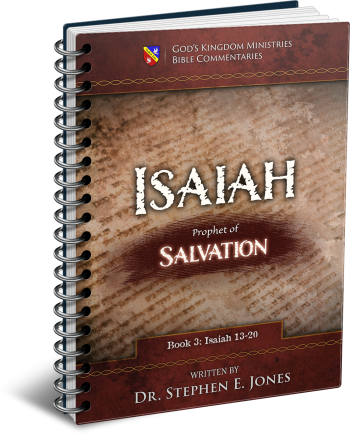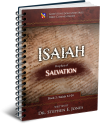Latest Posts
View the latest posts in an easy-to-read list format, with filtering options.

Isaiah is the prophet of Salvation. He is also known as the truly "Universalist" prophet, by which is meant that He makes it clear that salvation is extended equally to all nations and not just to Israel. He lived to see the fall of Israel and the deportation of the Israelites to Assyria, and he prophesied of their "return" to God (through repentance). He is truly a "major prophet" whose prophecies greatly influenced the Apostle Paul in the New Testament.
Category - Bible Commentaries

Isaiah 14:9-11 has also been used by theologians to assert that the dead are conscious, since the prophet describes a scene where “the spirits of the dead” (rapha—not ruach) welcome the king of Babylon. That interpretation takes the passage literally, rather than metaphor-ically. The problem, of course, is that such a view appears to contradict other biblical statements, which were meant to be taken literally. Eccl. 9:5, 6, 10 says,
5 For the living know they will die; but the dead do not know anything, nor have they any longer a reward, for their memory is forgotten. 6 Indeed, their love, their hate, and their zeal have already perished, and they will no longer have a share in all that is done under the sun… 10 Whatever your hand finds to do, do it with all your might; for there is no activity or planning or knowledge or wisdom in Sheol where you are going.
There is no indication that Solomon was speaking metaphorically in these verses. He was giving people sound advice for their lives on earth. In essence, he tells men to be diligent in their work on earth, because it will cease when they go to Sheol.
This is confirmed by David in Psalm 6:4, 5,
4 Return, O Lord, rescue my soul; save me because of Your lovingkindness, 5 for there is no mention of You in death; in Sheol, who will give You thanks?
Again, he says in Psalm 30:9,
9 What profit is there in my blood, if I go down to the pit? Will the dust praise you? Will it declare Your faithfulness?
The question is this: Did Isaiah contradict David? The best answer is found in Hezekiah’s prayer after he had been healed of his fatal illness. Later, in Isaiah 38:18, 19 the prophet says,
18 For Sheol cannot thank You; death cannot praise You; those who go down to the pit cannot hope for Your faithfulness. 19 It is the living who give thanks to You, as I do today; a father tells his sons about Your faithfulness.
It is not likely that Isaiah would record Hezekiah’s prayer if he disagreed with its statements, unless it was accompanied by some explanation or disavowal. There are many apparent contradictions in Scripture that are resolved only by understanding that the Hebrew language paints vivid word pictures that use metaphorical language. That is how we must interpret Isaiah 14:9-11, as also with Jesus’ parable of the Rich Man and Lazarus.
The Old Testament writers do not discuss the differences between spirit, soul, and body. Either they assume that we know the differences or else they themselves did not have a clear understanding of such things. Nonetheless, the truth is preserved, although men’s views differ on how to interpret those passages.
We saw earlier in Psalm 6:4, where David asked God, “rescue my soul.” The same prayer is repeated in Psalm 35:17. David was concerned that his soul would die. His concern was very real, as we read in Ezekiel 18:20, KJV, “the soul that sinneth, it shall die.” Both David and Ezekiel speak of nephesh, “soul,” showing that it is as mortal as the body.
The soul is the seat of consciousness for the “natural man” (i.e., psuchikos, “soulish” man). Adam was made a living soul (Gen. 2:7, KJV; 1 Cor. 15:45). When we are born of natural parents, our seat of consciousness is likewise lodged in the soul. The soul dies.
However, the plan of God is for us to be begotten by the seed of the word, forming a new creature, a new being. We are then able to transfer our identity (seat of consciousness) to that new spiritual creature that is patterned after the last Adam (Christ), who “became a life-giving spirit” (1 Cor. 15:45). Paul thus distinguishes between Adam and Christ, saying in 1 Cor. 15:46,
46 However, the spiritual is not first, but the natural [psuchikos, “soulish”]; then the spiritual.
When our “I am,” or conscious identity, is transferred from the soul (inner soulish man) to the spirit (inner spiritual man), we can say truthfully that we are new creatures. No longer are we the creature that was born of natural parents. We are children of God and are thus admonished to live our lives out of that new conscious identity.
The point is that this new spiritual identity is immortal, as we learn from 1 Peter 1:23-25, where the apostle compares the two identities. That which is begotten from perishable seed (from natural parents) is compared to grass and flowers, which manifest a certain glory for a short time before withering and dying. “But the word of the Lord endures forever,” he says, for it is the seed from God that never dies.
The Old Testament does not clearly reveal this Sonship truth except in types and shadows. But we do see clearly that the soul dies. When Rachel died in childbirth, Gen. 35:18 says,
18 It came about as her soul was departing (for she died), that she named him Ben-oni, but his father called him Benjamin.
Death, then, was seen as the death of the soul, which departed to Sheol, the place of the dead. Her body was then buried as well. The soul dies with the body, for the soul is fleshly. We read in Lev. 17:11 (reading literally), “the fleshly soul is in the blood.” Being fleshly, the soul dies for it is attached to the body.
Ecclesiastes 12:7 says,
7 then the dust will return to the earth as it was, and the spirit will return to God who gave it.
So also, when Jesus died, His body was buried in a tomb (Mark 15:46), His soul went to Hades/Sheol (Acts 2:27), and His Spirit returned to God (Luke 23:46). Jesus’ soul had to die, because the fleshly soul is in the blood, and His blood had to be poured out upon the ground on behalf of our souls.
This principle was established by the entire sacrificial system, where the blood of a lamb was poured out under the altar to pay the penalty for the sin in our own souls.
Jesus’ spirit was not called to die for the souls of men. It was the death of His soul that accomplished this, and for this reason, Isaiah 53:10, KJV says, “when thou shalt make His soul an offering for sin.” Again, Isaiah 53:11, KJV says, “as the result of the anguish of His soul, He will see it and be satisfied.” Once again, Isaiah 53:12, KJV says, “because He hath poured out His soul unto death.” Because the soul is in the blood, it is the blood that is poured out under the altar of sacrifice (Lev. 4:7, 18, 25, 30, 34).
In each case, the “soul” is from the Hebrew word nephesh, not ruach (“spirit”). By knowing the laws of blood and by distinguishing between the soul and the spirit, we may understand Isaiah’s metaphor in Isaiah 53 as well as Isaiah 14:9-11.
Isaiah 14:9 says,
9 Sheol from beneath is excited over you to meet you when you come; it arouses for you the spirits of the dead [rapha] all the leaders of the earth.
These unbelieving kings of the various conquered nations welcome the king of Babylon to Sheol. It is significant that Isaiah does not tell us that their ruach (“spirit”) welcomed him. Instead, the prophet uses the term rapha, “shades, ghosts.” The root word means “to cast down, to fall” and also “to heal, mend,” in the sense that such men are in need of mending. The “mending” in this case is probably a reference to mending spirit, soul, and body after these have been torn apart.
It appears that the ruach (“spirit”) of the righteous are qualitatively different from the rapha of the unbelievers. The rapha have not yet ascended or returned to God, and yet it may be that the rapha retains consciousness that is separate from the soul which has lost consciousness.
The prophet again uses the term rapha in Isaiah 26:14,
14 The dead will not live, the departed spirits [rapha] will not rise; therefore You have punished and destroyed them, and You have wiped out all remembrance of them.
Isaiah tells us that rapha (or rephaim, plural) will not rise. Only ruach can return to God, because rapha is part of the realm of death. It seems that on the day of judgment, those whose identity is yet rapha will be raised as ruach to appear before the Great White Throne. These appear to be different forms of conscious identity after death.
The giant king, Og of Bashan, was said to be a Rephaim (Deut. 3:11, 13). Bashan itself was known as “the land of Rephaim.” In this case, the giants were of the Nephilim (Gen. 6:4) that came again after the flood had destroyed the earlier giants. Gen. 6:4 says, “and also afterwards” more Nephilim were spawned, though no details are given in Scripture. We know only that there were giants in Bashan and throughout the land of Canaan in the time of Moses and even as late as the time of David.
We do not know if the kings welcoming the king of Babylon were all giants or not. The Rephaim (plural of rapha) may refer specifically to dead Nephilim, or perhaps the term was later applied more broadly to all of the wicked who had died.
The distinction between rapha and ruach is a topic that should be pursued further at another time.